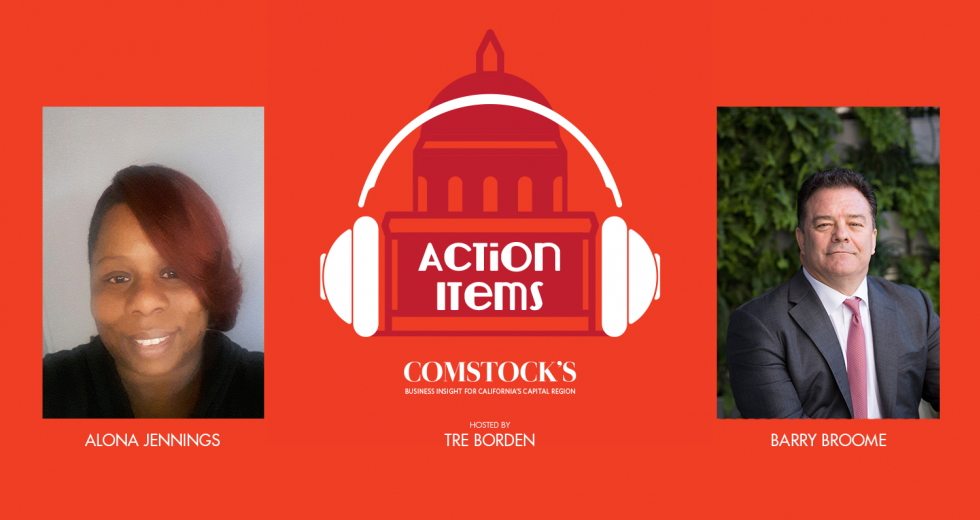Sacramento has become too comfortable. Local government and business leaders need to disrupt the old way of doing things, and we have just the advantage over other markets: our diversity. Sacramento is regularly ranked as one of the most diverse cities in the U.S. Now, if only we could get companies, investors and entrepreneurs to recognize not just the social and cultural value of the city’s diverse population — but the economic power, as well.
On this episode of Action Items, Greater Sacramento Economic Council CEO and President Barry Broome joins Code for Hood cofounder Alona Jennings and host Tre Borden to discuss the need for Sacramento to disrupt its economy by leveraging its diversity.
How can Sacramento change its economy?
Companies such as Apple and Google have made a big commitment to racial, ethnic and gender inclusion within their ranks. That should give Sacramento a headstart in attracting these tech giants as they expand or build new campuses, as they could draw from the Capitol Region’s diverse population for their workforce. “But what does Google do? They take a tax cut from Texas,” Broome says. Since 2014, about two-dozen tech companies have left the Bay Area, bypassing Sacramento on their way to the lower taxes of the Lone Star state.
How can Sacramento get publicized corporate values to translate into local investment? Broome says the City of Sacramento’s $10 million Innovation and Growth Fund is a good start, which last year doled out nearly $1 million for startups and nonprofits through its RAILS program. But, Broome says, the City should be investing $10 million a year: It was show the outside world we really mean business.
How can we create a workforce pipeline?
One RAILS grant recipient is Alona Jennings, whose Operation Innovate gives digital badge certification to track the STEM training of students — through involvement in hackathons, summer coding classes and other programs “to let kids tinker and see if they’re interested,” she says. Youth need to be introduced to technology and entrepreneurship as young as possible; waiting until college is too late. Both Operation Innovate and her Code for Hood focus on children in underserved neighborhoods.
Those children might grow up to work as engineers in the automotive industry. Sacramento is close to being designated a “Green City” and getting $44 million from now until 2020 to promote zero-emissions vehicles as part of a Volkswagen settlement. What if that money went into disadvantaged neighborhoods to build infrastructure and prepare a skilled workforce? “This could be the biggest move in the history of Sacramento to change its culture,” Broome says.
Click for the full conversation. Got something to say? Let us know your thoughts on diversity and career pathways by tweeting @ActionItemsPod with #SacramentoWorking
Subscribe to Action Items on iTunes and Stitcher.
Recommended For You

Action Items: Is There a ‘Right’ Way to Revitalize?
Mayor Darrell Steinberg and Sacramento Neighborhood Coalition
Co-Facilitator Katie Valenzuela Garcia on economic development
and neighborhood identity.

Action Items: Mind Your Own Political Business
Cassandra Pye and Josh Wood discuss how businesses can strategically take sides
On this episode of Action Items, communications strategist Cassandra Pye and Josh Wood, CEO of Region Business join host Tre Borden to discuss the fragile mixing of politics with business.

Action Items: Expanding Our Creative Capital
Clay Nutting and Celestine Syphax discuss collaboration between established and grassroots art institutions
On this episode of Action Items, arts entrepreneur and restaurateur Clay Nutting joins Celestine Syphax to discuss what the grassroots art movement can learn from institutional arts organizations in the Capital Region — and vice versa.

Action Items: Lifting People Out of Homelessness
Crest Saechao and Rivkah Sass discuss how third spaces can help serve homeless community members
On this episode of Action Items, Crest Saechao, director of DECODE and bootcamp curriculum at Hacker Lab, joins Rivkah Sass, executive director of Sacramento Public Library, and host Tre Borden to discuss the role of third spaces in addressing homelessness.

Action Items: Creating a Culture of Community Around Transportation
Heather Fargo and Michael Rios discuss how public transportation can better serve all residents in the Capital Region
For many adults who didn’t grow up using public transportation, getting them to do so now is an uphill battle, especially in a place like Sacramento where we lack a culture of transit use. But with the recent hire of Henry Li as CEO for Regional Transit, the Golden 1 Center inviting a new crowd to take light rail downtown and an ongoing interest in sustainable modes of traveling, the time has never been better for the Capital Region to prioritize public transportation.



